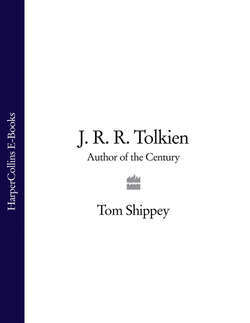Читать книгу J. R. R. Tolkien: Author of the Century - Tom Shippey - Страница 6
The author of the century
ОглавлениеAfter this preamble, one may now consider the claim, or claims, made in this book’s title. Can Tolkien be said to be ‘the author of the century’? Any such claim, ambitious as it is, could rest on three different bases. The first of them is simply democratic. That is what opinion polls, and sales figures, appear to show. The details are given immediately below, along with some consideration of how they should be interpreted, and how they have been; but one can say without qualification that a large number of readers, both in Britain and internationally, have agreed with the claim, and that they have done this furthermore without prompting or direction.
The second argument is generic. As the commissioning editor said, fantasy, especially heroic fantasy, is now a major commercial genre. It existed before Tolkien, as is again discussed below, and it is possible to say that it would have existed, and would have developed into the genre it has become, without the lead of The Lord of the Rings. This seems, however, rather doubtful. When it came out in 1954-5 The Lord of the Rings was quite clearly a sport, a mutation, lusus naturae, a one-item category on its own. One can only marvel, looking back, on the boldness and determination of Sir Stanley Unwin in publishing it at all – though significantly enough, he hedged his bet by entering into a profit-sharing agreement with Tolkien by which Tolkien got nothing till there were some profits to share, a matter clearly of some doubt at the time. Unwin had moreover continued to support and encourage his author over a seventeen-year gestation period which in the event delivered quite a different birth from what had been intended. It is true that he never had to pay over the large sums which James Joyce’s backers did, for instance, while Joyce was producing Ulysses, but then neither he nor Tolkien ever had the kind of support from a professional literary elite which Joyce and his benefactors could count on. However, while Ulysses has had few direct imitators, though many admirers, after The Lord of the Rings the heroic fantasy ‘trilogy’ became almost a standard literary form. Any bookshop in the English-speaking world will now have a section devoted to fantasy, and very few of the works in the section will be entirely without the mark of Tolkien – sometimes branded deep in style and layout, sometimes showing itself in unconscious assumptions about the nature and personnel of the authors’ invented fantasy worlds. The imitations, or emulations, naturally vary very widely in quality, but they all give pleasure to someone. One of the things that Tolkien did was to open up a new continent of imaginative space for many millions of readers, and hundreds of writers – though he himself would have said (see above) that it was an old continent which he was merely rediscovering. An acceptably philological way of putting it might be to say that Tolkien was the Chretien de Troyes of the twentieth century. Chretien, in the twelfth century, did not invent the Arthurian romance, which must have existed in some form before his time, but he showed what could be done with it; it is a genre whose potential has never been exhausted in the eight centuries since. In the same way, Tolkien did not invent heroic fantasy, but he showed what could be done with it; he established a genre whose durability we cannot estimate.
The third argument has to be qualitative. Popularity does not guarantee literary quality, as everybody knows, but it never comes about for no reason. Nor are those reasons always and necessarily feeble or meretricious ones, though there has long been a tendency among the literary and educational elite to think so. To give just one example, in my youth Charles Dickens was not regarded as a suitable author for those reading English Studies at university, because for all his commercial popularity (or perhaps because of his commercial popularity) he had been downgraded from being ‘a novelist’ to being ‘an entertainer’. The opinion was reversed as critics developed broader interests and better tools; but although critical interest has stretched to include Dickens, it has not for the most part stretched to include Tolkien, and is still uneasy about the whole area of fantasy and the fantastic – though this includes, as has been said, many of the most serious and influential works of the whole of the later twentieth century, and its most characteristic, novel and distinctive genres (such as science fiction).
The qualitative case for these genres, including the fantasy genre, needs to be made, and the qualitative case for Tolkien must be a major part of it. It is not a particularly difficult case to make, but it does require a certain open-mindedness as to what people are allowed to get from their reading. Too many critics have defined ‘quality’ in such a way as to exclude anything other than what they have been taught to like. To use the modern jargon, they ‘privilege’ their own assumptions and prejudices, often class-prejudices, against the reading choices of their fellowmen and fellow-women, often without thinking twice about it. But many people have been deeply and lastingly moved by Tolkien’s works, and even if one does not share the feeling, one should be able to understand why.
In the following sections, I consider further the first two arguments outlined above, and set out the plan and scope of the chapters which follow, which form in their entirety my expansion of the third argument, about literary quality; and my answer to the question about what Tolkien felt he had to say.
